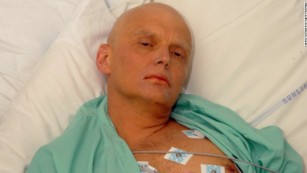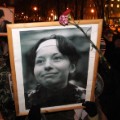London (CNN)Russian President Vladimir Putin probably approved the operation by Russian officials to kill former FSB spy Alexander Litvinenko in 2006, a detailed UK inquiry has concluded.
Retired High Court Judge Robert Owen, who conducted the inquiry, wrote that he was "sure" that two former Russian officials poisoned the 44-year-old at a London hotel with highly radioactive polonium-210.
And Owen wrote that he was also "sure" that the two men who poisoned Litvinenko -- former KGB and FSB employee Andrei Lugovoi and former Russian army officer Dmitri Kovtun -- were acting on behalf of others, probably the Russian spy service, the FSB.
"The FSB operation to kill Mr. Litvinenko was probably approved by Mr. Patrushev and also by President Putin," Owen wrote. Nikolai Patrushev was head of the FSB in 2006.
The findings related to Putin's guilt -- even if it is viewed as probable rather than definitively proved -- will offer some comfort to Litvinenko's widow Marina. She said outside the High Court on Thursday she was "pleased that the words my husband spoke on his deathbed when he accused Mr. Putin of his murder have been proved true in an English court."
Who was Alexander Litvinenko?
Litvinenko was a former Russian security agent who came to Britain in 2000 after turning whistleblower on the FSB, the successor agency to the KGB.
According to Marina, her husband then started working for Britain's security services.
Read more: Why was ex-spy a marked man?
Litvinenko had many enemies. His last job at the FSB was heading up its anti-corruption department. It was in the chaos of the 1990s, in the aftermath of the collapse of the Soviet Union, that may have brought him into conflict with ruthless colleagues.
Owen quotes in his report a Russian saying, "There is no such thing as a former KGB man."
After leaving the FSB, Litvinenko blamed the service for orchestrating a series of apartment bombings in Russia in 1999 that left hundreds dead and led to Russia's invasion of Chechnya later that year.
All or any of the above may have been sufficient reason to kill a man seen by his former FSB colleagues as a traitor -- a man who once even published an article cited in Owen's report that accused Putin of being a pedophile.
What caused his death?
In a deathbed statement, read to the media by a friend, Litvinenko blamed Putin for ordering his poisoning, saying the rare radioactive substance polonium-210 was slipped into his tea at a meeting with the two suspects in Mayfair in 2006.
He said: "You may succeed in silencing one man but the howl of protest from around the world will reverberate, Mr. Putin, in your ears for the rest of your life."
The Kremlin has always denied the accusation, as did Lugovoi and Kovtun, whom the Russian government refuses to extradite to Britain. But the Kremlin's case isn't helped by the compelling evidence against it.
Polonium-210 occurs naturally, but scientists say the high concentrations found in the Litvinenko case indicate production at a nuclear reactor, or perhaps a particle accelerator. The kinds of facilities, in other words, controlled by a state.
Russia isn't the only country capable of producing polonium-210. But the radioactive trail left by the substance was traced across London, while three British Airways aircraft that had flown a number of routes, including London to Moscow, were reported to be contaminated with an unnamed radioactive substance.

















No comments:
Post a Comment